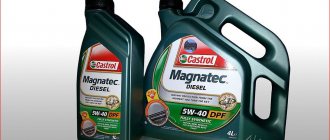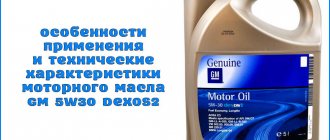Motor oil, regardless of whether it is mineral or synthetic, loses its usability over time.
The period of possible use of motor oil is influenced by various factors, but sometimes even fluid that is expired according to the manufacturer’s instructions can remain suitable for use. Therefore, you should understand in detail what the expiration date of engine oil is and whether it is possible to use expired engine lubricant.
This question is especially relevant, since in any case, after the expiration date, the product gradually loses its properties and its use turns out to be useless.
It is necessary to monitor the life and quality of the oil so as not to harm your vehicle. Otherwise, you can cause major damage to the machine.
Various technologies for the production of synthetic and mineral oils, which are still used in 2020, lead to the fact that, due to its formula, synthetic oil practically does not enter into chemical reactions with the external environment.
Kinds
The manufacturer offers car owners a variety of lubricants.
The classification of fuels and lubricants is determined by the temperature conditions in which it can operate, as well as the chemical composition of the latter.
Regarding temperature conditions, machine oils have the following gradation:
- all-season;
- summer;
- winter.
This is interesting! What a car owner needs to know about batteries
In addition, depending on the chemical composition, there are:
- Mineral oil is oil purified from various harmful impurities. A distinctive feature of this product is its increased viscosity. It is suitable for cars whose mileage does not exceed 100,000 kilometers. A significant disadvantage is the need for frequent replacements and the low temperature of the operating range;
- Semi-synthetic oil is a lubricant made from a mineral base. This occurs through enrichment with various synthetic additives. The amount of synthetic substances in this oil is 30 - 50%. This type of oil is significantly superior to its mineral counterpart;
- Synthetic oil is produced by processing products from primary petroleum distillation. This type of oil has excellent properties, excellent fluidity, and operates over a wide temperature range.
Please note: the quality of the lubricant is the “health” of the car.
Basic parameters of oils depending on shelf life
We are concerned about the shelf life of the operating fluid because it loses its properties and cannot properly maintain the operation of the mechanism. This applies to engine oil to an even greater extent. The most important parameters for motor oils are:
- viscosity;
- specific gravity;
- freezing point;
- quantity and purpose of additives;
- ash content;
- service life in the engine.
The specific gravity of motor oil, as a characteristic, is very rarely used by the average consumer, but this parameter directly affects the viscosity. As well as the ash content, which shows the amount of flammable substances in the oil, and the ash content can change greatly during not only operation, but also storage of the oil. A wide variety of additives, present in any brand of oil to one degree or another, have little effect on the shelf life of synthetic or semi-synthetic oil. Mineral oils obtained as a result of distillation and distillation of oil are used very rarely and are stored even less.
How to choose quality products
When choosing a product, you need to pay attention to its viscosity, because this is its most important property.
Low viscosity will contribute to faster wear of parts.
A mixture with high viscosity will create problems for the starter; it will be quite difficult to “pump” the substance through a frozen engine. A product with excessive thickness slowly enters special channels, which leads to a lack of oil in the engine.
This is interesting: The first classification of motor oils was developed in the USA in 1913 by the Society of American Engineers.
To make the right choice, you need to know the special viscosity classification. There are several viscosity standards in the world, the most common standard is SAE.
A high numerical coefficient located after the abbreviation indicates the ability of the oil to maintain its properties during the heating process. In winter, car oil, on the contrary, thickens. The letter "W" indicates that the material is suitable for winter use.
In Europe, the lubricant classification system is very simple, it is indicated by Arabic numerals and depends on the type of engine (gasoline/diesel).
This is interesting! What is the depreciation period and why is it important to know?
How to store it correctly
There are several storage conditions for the lubricant:
- the canister or bottle must be tightly closed;
- sunlight should not fall on the substance;
- the shelf life does not exceed one year from the date of manufacture;
- the room temperature should not exceed 24 degrees, otherwise the oil mixture will begin to separate;
- High humidity in the room should be avoided.
Please note: substances that are not used within a year of manufacture may cause harm to the vehicle's engine.
Useful tips regarding storing oil
- The stability of the composition will remain within the temperature range from 19 to 38 degrees.
- The ideal place for storage would be a shaded place, since in the light the product will become cloudy and the additives will partially turn into dense deposits.
- The room in which the oil is stored should not be damp. If the humidity level is above 70%, insoluble particles form in the canister and can penetrate through the stopper that closes the container. If this happens, it will become impossible to separate the water from the oil.
- Dust and dirt should not get into the container, so the room, be it a garage or another building, must be kept clean.
The optimal solution would be the top shelf in the pantry, which is equipped in an apartment or private house. There, both humidity and temperature are stable, which means that the engine oil will be reliably stored.
Expiration date of popular brands
The shelf life depends on the “simplicity” of the substance.
It’s just that mineral oil without synthetic additives lasts longer than its expensive counterparts.
As a rule, the manufacturer does not recommend keeping the substance for more than a year, as the beneficial properties of the lubricant are lost.
Did you know that: mineral oil is a leader in conservation. It can last for about three years, but after a year it is undesirable to use it. Transmission oil lasts no more than two years.
Well-known world brands: CASTROL (Castrol), LUKOIL (Lukoil), MOBIL (Mobile), MOTUL (Motul), SHELL (Shell) declare that the shelf life of their motor oils is 5 years from the date of manufacture under the correct storage conditions.
Studying the label
Most manufacturers indicate shelf life on the label.
It should be noted that studying the label will help you understand how long the product can last and not be used. The date and time of production are located not only on the label. The date and time of manufacture will also be indicated on the canister itself, unless you buy a high-quality, branded product.
Expert advice: carefully inspect the labels, because counterfeit manufacturers will not bother making high-quality labels for the goods.
What conditions affect storage duration?
Engine oil is subject to various changes and deformations.
The chemical network of a substance can be disrupted as a result of exposure to various negative factors, which can be either man-made or the result of improper storage.
The environment where the oil is stored is fundamental to its preservation process.
Please note: it is necessary to store as far as possible from sources of open flame.
Negative storage conditions, such as: dampness, elevated temperature, which leads to expansion and contraction of the substance, oxidation processes due to contact with oxygen, will significantly affect the shelf life of the substance.
On the other hand, storage in a dry, ventilated area, without contact with sunlight, and the absence of oxygen will extend the shelf life of the properties.
This is interesting! How to deal with bad roads
Storage rules
The quality of a product is influenced by many reasons, among which are the conditions in which a person stores the product. The most widespread now are synthetic oils, which are considered the most stable and do not react with any environmental factors, but even they have storage conditions:
- Ambient temperature - 0 degrees;
- In general, the temperature range is 0-60 degrees;
- No temperature changes;
- There is no direct sunlight falling on the container;
- Humidity up to 80 percent.
Attention! If the container has already been opened, then you additionally need to remember that the oil must remain in a closed container. The material of the canister does not matter, the main thing is that it is original.
Determination of oil suitability
There are situations when it is necessary to increase the shelf life, making it longer than indicated on the label or canister.
There are several tips that will help you understand whether the product is suitable for further use:
- If, after long-term storage, sediment appears at the bottom of the canister, it should not be used.
- The mass should be homogeneous. Heterogeneity indicates that the product is spoiled and is undesirable to use.
- Color is the main indicator of a substance's suitability for use. A change in color indicates that oil should never be poured into the car engine.
Expert opinion: provided that none of the above deficiencies were found in the substance, then it can be poured into the engine.
Having created favorable storage conditions, you don’t have to worry about the fact that it will deteriorate quite quickly and become unsuitable for use.
What types of oil are offered to the consumer?
There are several types of motor oil:
- mineral based
- based on synthetic substances,
- containing both mineral and synthetic substances, that is, semi-synthetics.
Each of the oils contains a base, which is not used as a separate material, but is necessarily supplemented with additives. If the amount of additives and detailed composition are not indicated on the oil canister, then most likely the oil has a mineral base.
To operate a vehicle, its documents indicate what type of engine oil must be used. It is advisable not to violate the rules and recommendations from the manufacturer, otherwise unexpected engine failure may occur.
Note! Lubricants are unique in their composition, so it is strictly forbidden to mix them. Such cases led to unknown chemical reactions, disabling not only individual engine components, but also the entire engine.
Motor oil is divided by viscosity, this is stipulated in GOST: winter, summer and all-season oil can be distinguished by the numbers indicated on the packaging. The higher they are, the greater the viscosity percentage.
Errors when determining an expired product
Discoloration and the appearance of an unpleasant odor may be mistaken for factors that make the substance unsuitable for use in a car engine.
However, this is not quite true. Color may change due to other factors, not necessarily environmental influences.
The appearance of an odor may be due to the fact that the canister was not made from entirely benign components, which, without damaging the structure of the substance being tested, added a specific aroma to it.
This is interesting! Transport tax on a car: how to check your debt online
It is necessary to have an indicator that can reliably indicate the suitability of the product for use.
Experts are convinced: every car owner must have a special substance that can show the suitability of fuels and lubricants for use, as well as return them to operation. Such an indicator can be purchased at any auto parts store.
On the market you can find special additives that can restore life to the substance. The use of such substances will allow chemical processes to be restarted and prepared for further operation.
Important to know: you should periodically check the level and color of the oil in your car. If the car oil becomes dirty, then this is a good indicator, do not worry - there is a rapid transfer of oxidation products from the engine to the filter.
How to make sure the oil is suitable for use
- There should be no sediment in the structure of the product. The exception is synthetic oil, in which a minimum amount of sediment is allowed.
- The structure of the motor fluid should be homogeneous and dense. If the density is different, either liquid or viscous, oil should not be used. This issue can be easily resolved. Using a “drop” test. Take a piece of newspaper or other paper that has a porous structure, apply a drop of oil, and observe the process: if the liquid quickly spreads over the paper with the formation of rainbow circles, you can conclude that the oil “lives” and is suitable for use. If it has frozen into a drop, you cannot take it.
- If there is an unpleasant odor reminiscent of the “aroma” of rotten eggs, you can determine that the oil is highly oxidized. This can cause a corrosion process on metal parts, as a result of which the motor will soon fail.
Expired motor oil - can it be used?
Using an expired substance can negatively affect the performance of the car engine.
A change or even partial loss of qualities will negatively affect the operation of the internal components of individual parts of the machine.
The viscosity of your car oil may change, becoming much thicker. Every person understands what such consequences can lead to.
Repairing a car as a result of using a low-quality substance will be an expensive pleasure and an unpleasant surprise for car owners.
How to return a defective product to a store
In accordance with the law, the buyer has the right to return low-quality goods within 15 days after purchase.
At the end of this period of time, it is impossible to return or replace goods that turned out to be of poor quality.
In order to make an exchange and return, you need to contact the store where the products were purchased and, depending on the company’s internal policy, write a statement to return the goods or simply get your money back.
Most companies try not to neglect their reputation, so there should be no problems with returns. However, in any case, in accordance with the law, you can demand the return of your money.
Take note: do not throw away your grocery receipt until you are sure that it is of high quality and does not cause any complaints on your part.
Failure of store representatives to comply with your legal requirements is an offense and entails liability.










